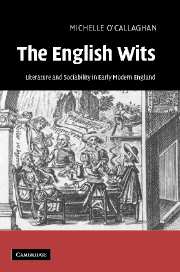Book contents
- Frontmatter
- Frontispiece
- Contents
- Acknowledgements
- Note on the text
- Introduction
- Chapter 1 Gentleman lawyers at the Inns of Court
- Chapter 2 Ben Jonson, the lawyers and the wits
- Chapter 3 Taverns and table talk
- Chapter 4 Wits in the House of Commons
- Chapter 5 Coryats Crudities (1611) and the sociability of print
- Chapter 6 Traveller for the English wits
- Chapter 7 Afterlives of the wits
- Notes
- Bibliography
- Index
Chapter 7 - Afterlives of the wits
Published online by Cambridge University Press: 22 September 2009
- Frontmatter
- Frontispiece
- Contents
- Acknowledgements
- Note on the text
- Introduction
- Chapter 1 Gentleman lawyers at the Inns of Court
- Chapter 2 Ben Jonson, the lawyers and the wits
- Chapter 3 Taverns and table talk
- Chapter 4 Wits in the House of Commons
- Chapter 5 Coryats Crudities (1611) and the sociability of print
- Chapter 6 Traveller for the English wits
- Chapter 7 Afterlives of the wits
- Notes
- Bibliography
- Index
Summary
Coryate's letter to the Sireniacs was addressed to a society, and not a collection of named individuals. This distinction is vital because it marks a stage in the history of sociability in the seventeenth century. The second half of this century saw the proliferation of voluntary societies; an innovation in associational practices that is one of the distinguishing features of civil society. The Sireniacal fraternity was more than an informal gathering that simply had an ongoing arrangement to share the cost of wine or a feast at a tavern. Each meeting was a highly ritualised and codified performance. The participants, for the duration of the meeting at the Mermaid tavern, freely and willingly invested their social identity in this self-regulating social formation, with its agreed structure of offices, codes of conduct, social rituals and symbolic practices.
If we look across the seventeenth century, then we can see societies like the Sireniacal fraternity as part of an ongoing transformation of literary and political culture and everyday life. They were the precursors to the later political clubs held at taverns and coffee houses in the second half of the century. Modes of private conviviality were infused by communicative practices that had undergone further rapid and radical transformation during the English revolution. The resulting forms of political sociability brought together and created citizens.
- Type
- Chapter
- Information
- The English WitsLiterature and Sociability in Early Modern England, pp. 153 - 177Publisher: Cambridge University PressPrint publication year: 2007



